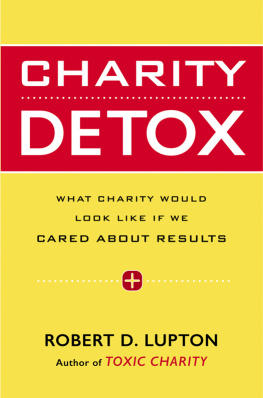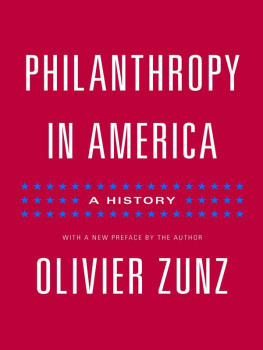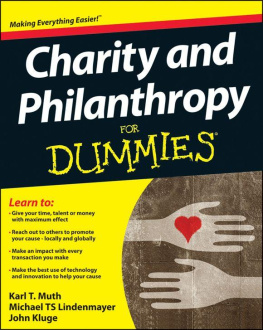Giving

Rembrandt van Rijn, Beggars Receiving Alms at the Door of a House. Reproduced, by permission, from the National Gallery of Art, Washington, Rosenwald Collection
Giving
CHARITY AND PHILANTHROPY IN HISTORY
Robert H. Bremner
First published 1994 by Transaction Publishers
Published 2017 by Routledge
2 Park Square, Milton Park, Abingdon, Oxon OX14 4RN
711 Third Avenue, New York, NY 10017, USA
Routledge is an imprint of the Taylor & Francis Group, an informa business
Copyright 1994 by Taylor & Francis.
All rights reserved. No part of this book may be reprinted or reproduced or utilised in any form or by any electronic, mechanical, or other means, now known or hereafter invented, including photocopying and recording, or in any information storage or retrieval system, without permission in writing from the publishers.
Notice:
Product or corporate names may be trademarks or registered trademarks, and are used only for identification and explanation without intent to infringe.
Library of Congress Catalog Number: 93-14165
Library of Congress Cataloging-in-Publication Data
Bremner, Robert Hamlett, 1917
Giving: charity and philanthropy in history / Robert H. Bremner.
p. cm.
Includes bibliographical references and index.
ISBN 1-56000-137-2
1. CharitiesHistory. I. Title.
HV16.B74 1993
361.7'09 dc20
93-14165
CIP
ISBN 13: 978-1-56000-884-2 (pbk)
IN MEMORY OF
My parents, George L. and Sue Hamlett Bremner,
and my sisters, Elizabeth, Virginia, and Margaret,
who shared and encouraged love of reading
and sympathy for the less fortunate
My chief debt, gratefully acknowledged, is to the authors, dead and alive, whose words I have quoted and stories retold. I wish to thank the National Urban League, Inc. for permission to quote "How Thin a Blanket" by Langston Hughes.
During preparation of the volume Merle Curti, Richard Magat, Thomas R. Buckman, Irving Louis Horowitz, and Paul A. Varg offered encouragement and welcome advice. Frank Annunziata thoughtfully furnished clippings about charity and philanthropy from a wide variety of magazines and newspapers.
Professor Joseph Lynch shared his knowledge of church history and hagiography with me. He and his successor as chair of the Department of History at the Ohio State University, Michael J. Hogan, kindly made office space and secretarial help available. I wish to thank the office staff of the Department of History for cordial assistance. I am also grateful to members of the reference, circulation, and interlibrary loan departments of the Ohio State University Library for services rendered over many years. I am especially appreciative of Stephen W. Rogers's aid in locating hard-to-find materials and helping solve bibliographical problems.
Clayton Roberts, Ann Bremner, and Michael Spicer went out of their way to provide information on the current state of centuries-old English charitable foundations. Sue Bremner made valuable editorial and stylistic suggestions. I am particularly grateful to Maria Mazon for her skill and patience in typing the manuscript, and to Catherine Marting Bremner for unstinting assistance at every stage of the work.
Giving, like love, is an element of both charity and philanthropy; love sometimes is left out, but giving is essential. Getting is important, too, but giving comes first. We can scarcely open our mail, answer the telephone, or walk down a city street without encountering opportunities to give. In addition to tangible things, we give or withhold love, trust, friendship, encouragement, sympathy, help, and advice. What we give to alleviate the need, suffering, and sorrow of others, whether we know them or not, is charity. What we give to prevent and correct social and environmental problems and improve life and living conditions for people and creatures we don't know and who have no claim on us is philanthropy.
The following pages survey attitudes toward charity and philanthropy in various periods from antiquity to the present. Histories of charity and philanthropy deal with what benevolent individuals and organizations have attempted to do, how they have proceeded, and whether or not their efforts have proved effective. This study, based on literary sources stories, poems and ballads, scripture and sermons, novels, biographies, essays, and plays examines and comments on what writers and characters in their works have had to say about giving in general and giving to the poor, beggars, and good causes. The advice and caveats they offer touch on altruism, self-interest, and gentility; they express opinions on religion, politics, social class, tolerance, and censoriousness; among the topics often discussed are sacrifice, pride, display, luxury, work, and laziness. Their testimony is rendered more valuable by the speakers' vehemence, opposing points of view, and frequent disagreements. Their pointed observations help the account avoid bland benignity.
Charity and philanthropy have so much in common (mainly giving) that the words are often used interchangeably. One respect in which they differ is in their degree of interest in the poor. Charity, a religious obligation to followers of Judaism, Christianity, and Islam, has an abiding commitment to relieve the poor, orphans, the friendless, and the homeless. Sympathy for the unfortunate and admonitions to love one's neighbors and coreligionists extend the meaning of charity to kindness to and consideration for others regardless of their need or faith. It is characteristic of charity to give others the benefit of the doubt. Someone who does not suffer fools gladly may be charitable in deed but probably not in thought.
Philanthropy, secular in origin and emphasizing love of man rather than God, has not been as closely involved with the poor as charity. In the seventeenth century philanthropy meant a benevolent disposition and humanistic turn of mind. In the eighteenth and nineteenth centuries it became associated with active participation in humanitarian reforms to improve the treatment of prisoners and the insane, abolish slavery, and obtain rights for women and workers. Toward the end of the nineteenth century philanthropy came to mean contributions of money to a variety of causes intended to benefit all classes of society. In recent years philanthropy has allowed government to assume most of the burden and cost of caring for people below the poverty line. Yet even those who believe this to be a necessary and proper state of affairs recognize that philanthropy can help the poor in a number of ways: by innovating and testing new services directed to those most in need, monitoring government programs for fairness and adequacy, acting as advocate for the neglected, and working for the empowerment of the disadvantaged.
Charity and philanthropy have never lacked critics. Charity has been attacked for spawning the poverty it relieves; both charity and philanthropy have been accused of serving the interests of donors rather than those of recipients. Philanthropy's mild method of reform is scorned by stern advocates of fundamental social change; on the other hand, philanthropic reformers' devotion to particular causes makes less dedicated people question their sanity. Bad motives are attributed to good deeds, and hypocrisy is allegedly as rife among practitioners of charity and philanthropy as among clergy and politicians. All of these charges are voiced, and some of them answered, by the authors whose works are discussed in the book. They are as quick to point out self-interest in the guise of altruism as stinginess hiding behind high principles.









